10 Best Vegetarian Protein Sources Recommended by Our Expert Nutritionist

The myth that vegetarian diets lack sufficient protein needs debunking. Vegetarians can get protein, and enough of it, from various meat-free sources, and certainly enough to build muscle and to meet their fitness goals. You just need to know where to look.
What is true is that it’s not easy. Well, certainly not as easy as a diet that includes steak, chicken and fish. But, with some planning, a meatless diet can provide all the protein and nutrients your body needs.
Nutrition Know-How to Help Build Muscle
Here's a selection of useful links that will take you to the pages that help explain nutrition and its role in building muscle along with some workout guides and the best supplements to compliment your diet.

Can I Build Muscle on a Vegetarian Diet?
Yes.
Don’t believe us? Did you know that Olympic swimmer Tom Daley is a vegetarian? As is former boxing heavyweight champion David Haye. We’ve even had vegetarians on our front cover, most notably Liam Hemsworth and Men’s Health Hero of Muscle and Mr Olympia, Arnold Schwarzenegger. If going meat-free is good enough for Arnie, then it’s certainly good enough for you.
While research suggests that plant-based proteins are less efficient at building muscle than animal proteins due to their lower concentrations of essential amino acids (EAA), in particular leucine, an EAA that regulates processes such as protein synthesis, that doesn’t mean it’s impossible. You just need to obtain your EAAs from other food sources and in larger quantities.
Kate Neudecker, MH fitness and registered nutritionist, says: "While plant-based protein sources may not be as bioavailable [easy to absorb] as meat sources, with adequate organisation, it is entirely possible to gain muscle mass, maintain muscle and reach your goals on a vegetarian diet."
What are essential amino acids?
In order to grow, function and build muscle, your body needs all 20 different amino acids. Your body can make nonessential amino acids, but it cannot make essential amino acids, of which there are nine. And the way to get them is through your diet.
Kate Neudecker, MH fitness and registered nutritionist, says: "By learning about the different amino acids in plant-based protein sources, you can adjust your meals accordingly so that you ensure your diet is just as optimal as a meat-eating diet, while also staying true to your ethical values."
The nine essential amino acids are histidine, isoleucine, leucine, lysine, methionine, phenylalanine, threonine, tryptophan, and valine. Of these nine, however, there's an important trio when it comes to maintaining all-important muscle mass: isoleucine, valine and leucine.
As we’ve mentioned, leucine, is the most important amino acid. Within your body, leucine diminishes during exercise, meaning that it must be replaced through your diet to help stimulate further protein synthesis and allow the body to build more muscle.
Almost all animal proteins contain the nine essential amino acids. However, only a handful of vegetarian foods can be classified as ‘complete proteins,’ which is why you need to make sure you eat a varied diet, combining several meat-free foods, to ensure you are consuming all nine amino acids with each meal.
Is There Enough Protein in Vegetarian Foods?
Unfortunately, the majority of veggie muscle-building sources are not very dense in protein. For example, if you eat 100 grams of chicken, you’ll eat 54 grams of protein, whereas knocking back 100 grams of tofu and you’ll only get eight grams.
Eating more of specific meat-free foods will help you get higher amounts of EAAs and protein into your system. A recent 2016 study measured a significant increase in muscle protein synthesis after subjects increased their intake of wheat protein from just 35g to 60g.
10 Best Vegetarian Protein Sources Recommended by Our Expert Nutritionist
Below are the best high protein vegetarian foods – recommended by our expert nutritionist – that contain (most of) the essential amino acids your body needs. And remember, you don’t need all nine essential amino acids from one food source. You can get them from numerous foods.
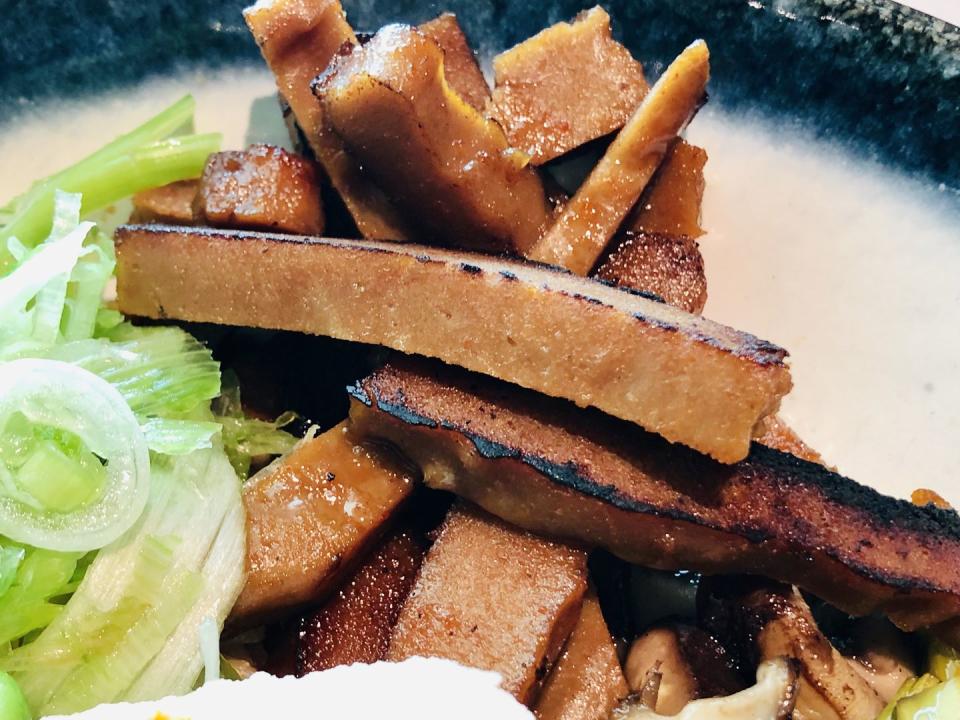
Seitan
With as much protein per calorie as chicken breast, it’s a top source of muscle fuel. It’s also low in fat and high in calcium – great for bone health – and contains all nine essential amino acids.
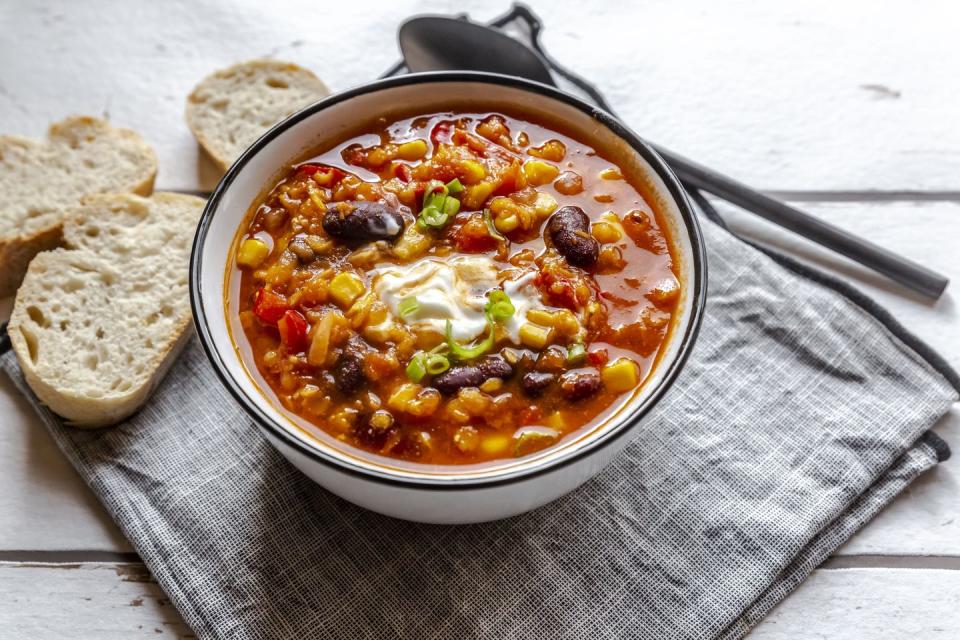
Beans
One cup of cooked beans will serve your muscles with 21 grams of protein. Packed full of fibre, essential for gut health, and helps lower cholesterol and high blood pressure, it’s a perfect vegetarian protein source. However, not all beans contain the same amino acid profile. Opt for black beans or kidney beans and aside from methionine, you’ll hit almost all the essential amino acids your body needs.
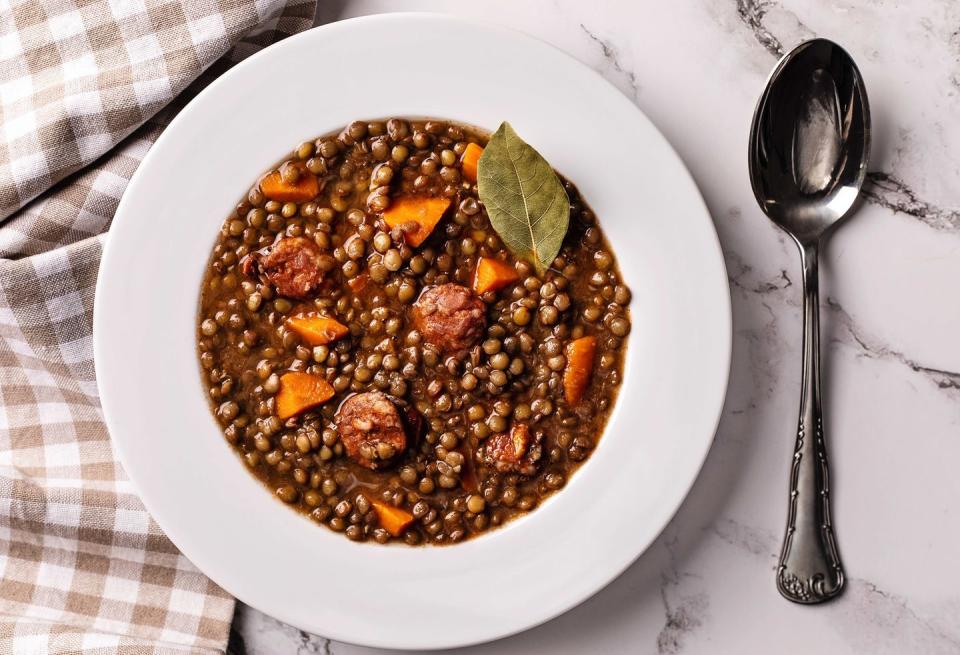
Lentils
Lentils are a fantastic source of protein with one 198 gram serving containing 18 grams of protein. Rich in folate manganese and iron, lentils can be combined with many dishes. Lentils are rich in several amino acids, including leucine but low in some, like tryptophan and methionine.

Eggs
The average large egg contains 6g protein and only 72 calories. Eggs contain all nine essential amino acids in a balanced ratio so your body can make full use of them within your vegetarian diet. It’s not all protein perks, one egg contains 0.6 micrograms of B12 which is roughly 25% of your daily needs. B12 is usually found in meat and is important in preventing a special type of anemia that makes people feel tired and weak – something very important for vegetarians.
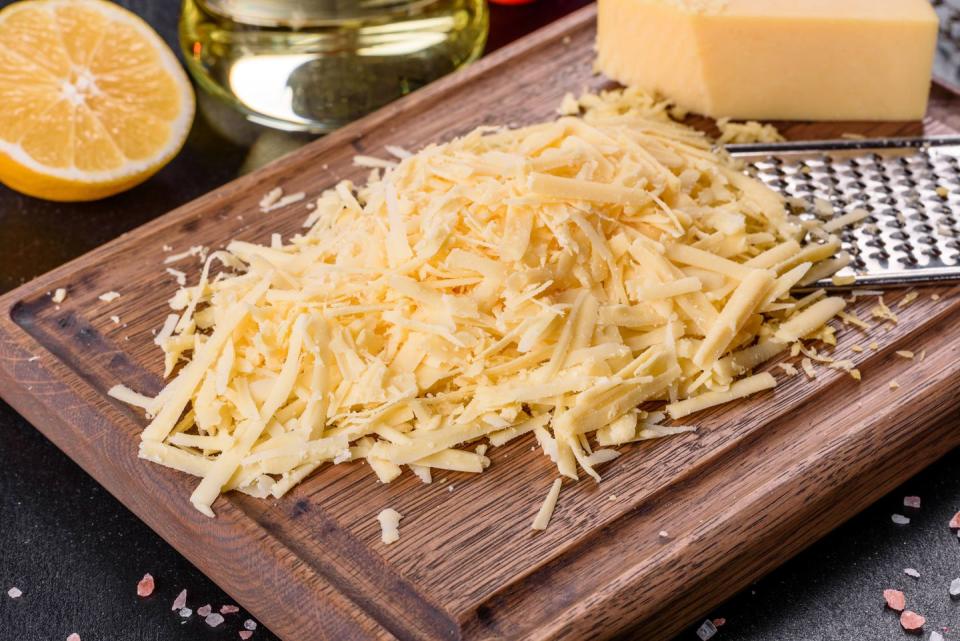
Cheese
Depending on the variety of cheese, it can be a great source of protein and other nutrients in your diet. For example, mozzarella contains 28 grams of protein per 100 grams. As an additional benefit, it is also high in calcium which is important in supporting bone health. It is another complete source of protein, containing nine essential amino acids.

Peas
Peas contain 5g of protein per 100g and only 81 calories. Peas are also a good source of dietary fibre making them a brilliant choice to have alongside your meals. Pair them with rice or beans in your vegetarian meals and you have a strong spectrum of amino acids. The vitamin and mineral content of peas may play important roles in the prevention of illnesses according to an article published by the Cambridge University Press.

Tofu
Tofu, which is made from soya, can be useful vegetarian high protein addition to your diet. It contains 8 grams of protein per 100 grams. Brilliant to grill, add to pasta and other dishes, tofu is a fast meat free solution.
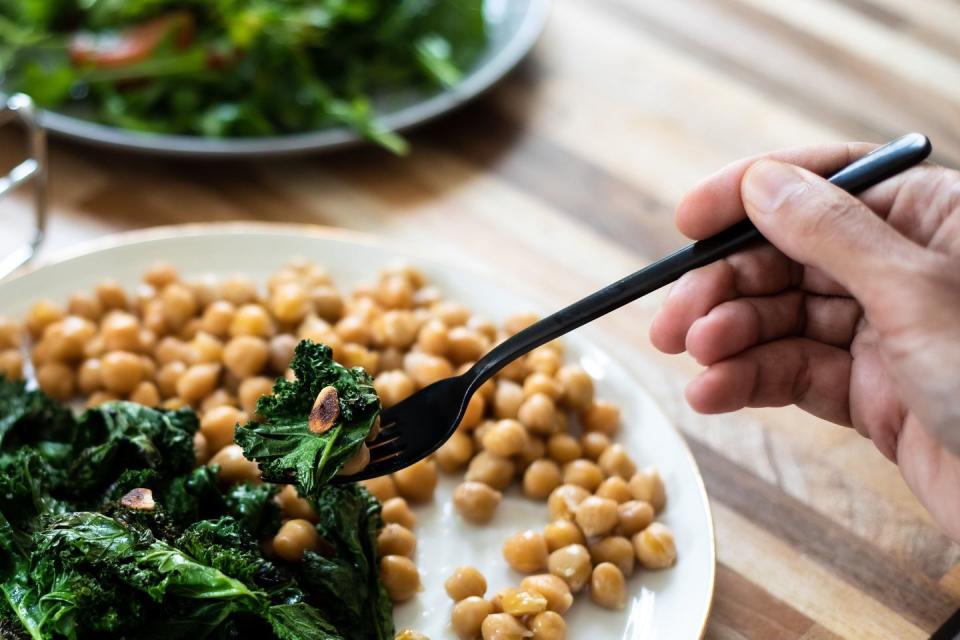
Chickpeas
Packing a decent protein punch of 19 grams of protein per 100 grams, chickpeas are a great addition to your vegetarian diet. They also contain 7-8 grams of fibre per portion and can be added easily to curries, salads or of course in our favourite hummus dip.
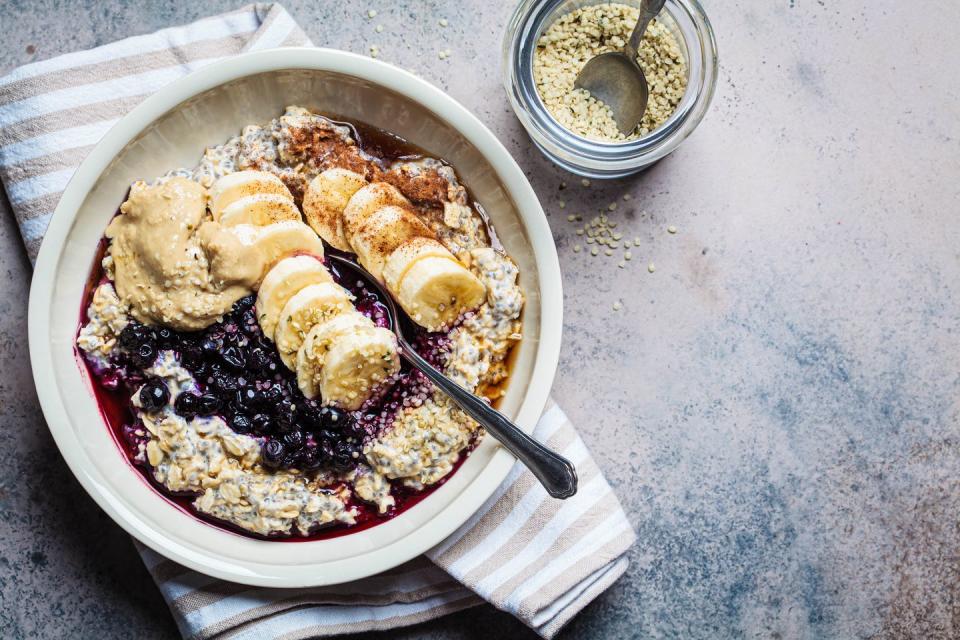
Oats
While they are mainly a carbohydrate source, oats are quite a unique grain with as much as 11 grams of protein per 100 grams. Throw them on yoghurt, prepare overnight oats or enjoy the traditional breakfast staple, porridge.
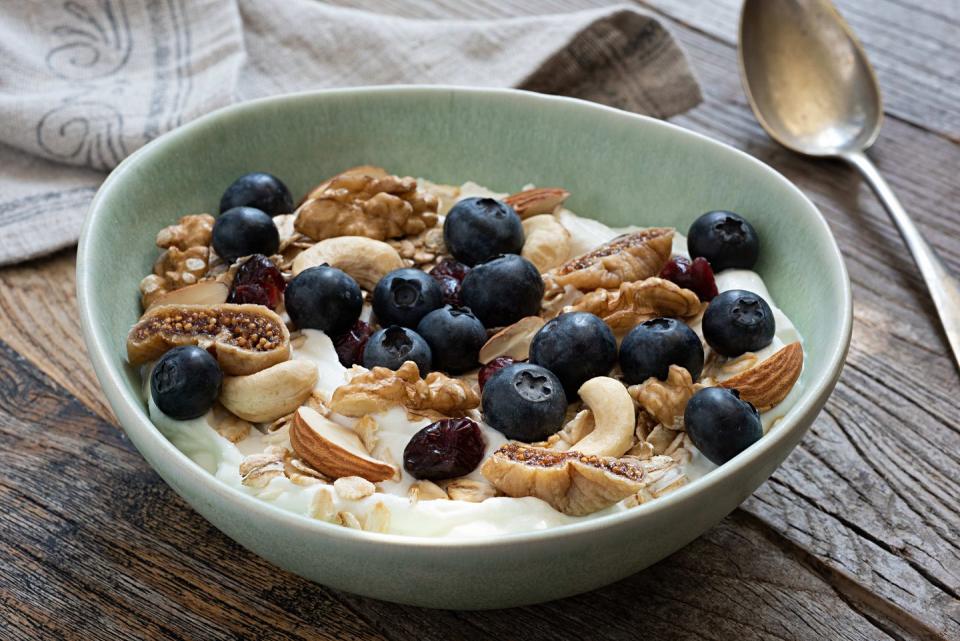
Greek Yoghurt
Greek yogurt contains around 10 grams per 100 grams, making it a great high protein snack solutions for vegetarians. Greek yoghurt tends to be lower in sugar in comparison to other yoghurts on the market, making it also suit your health goals.
You Might Also Like

 Yahoo Sport
Yahoo Sport 





































